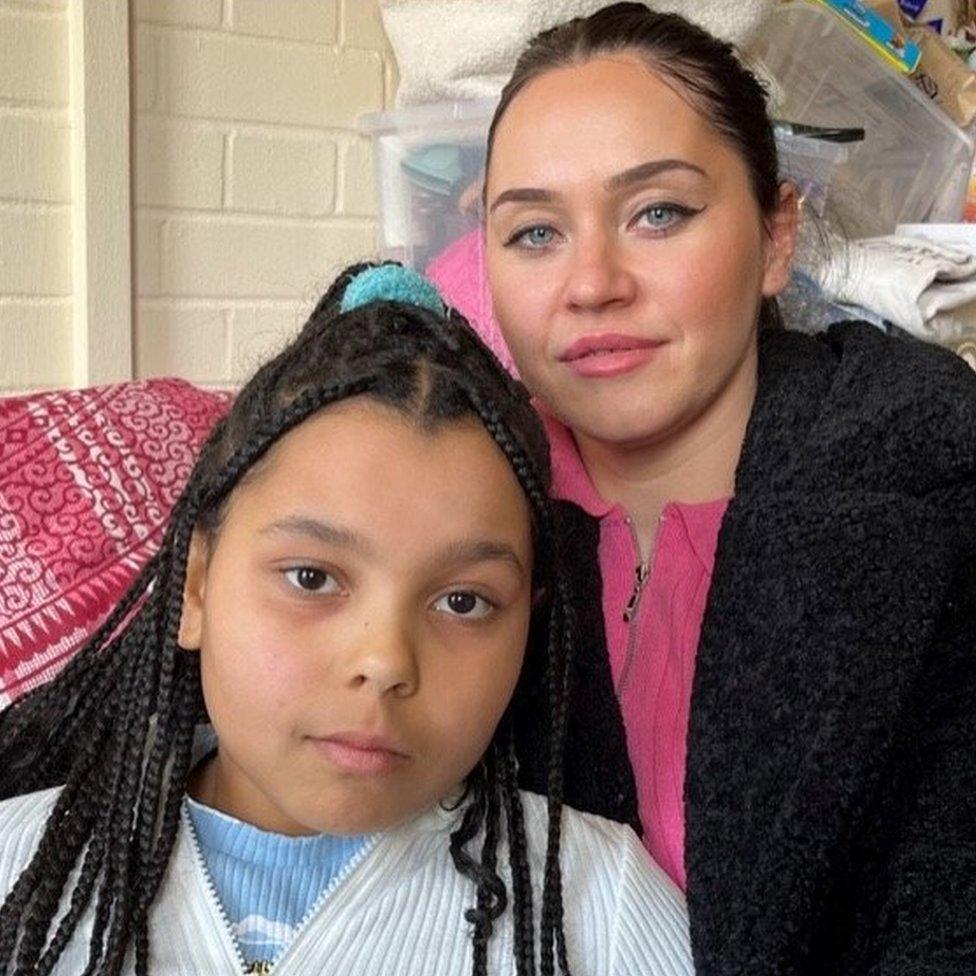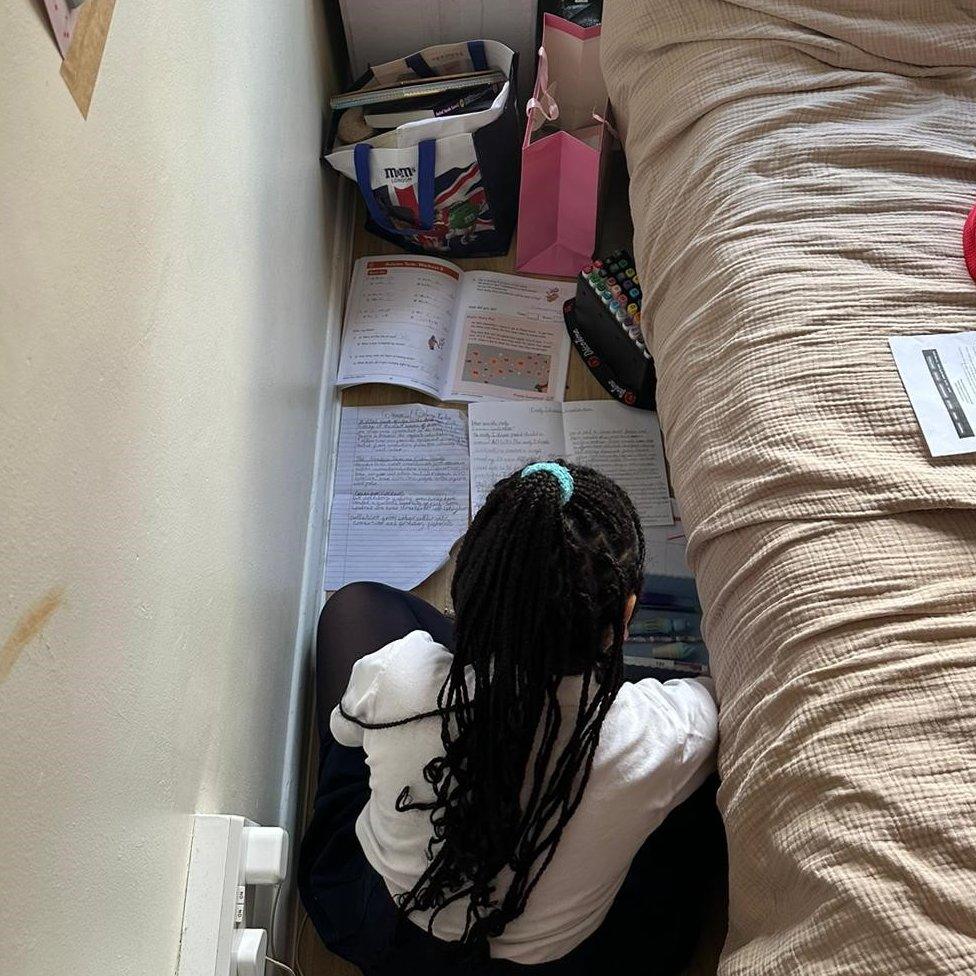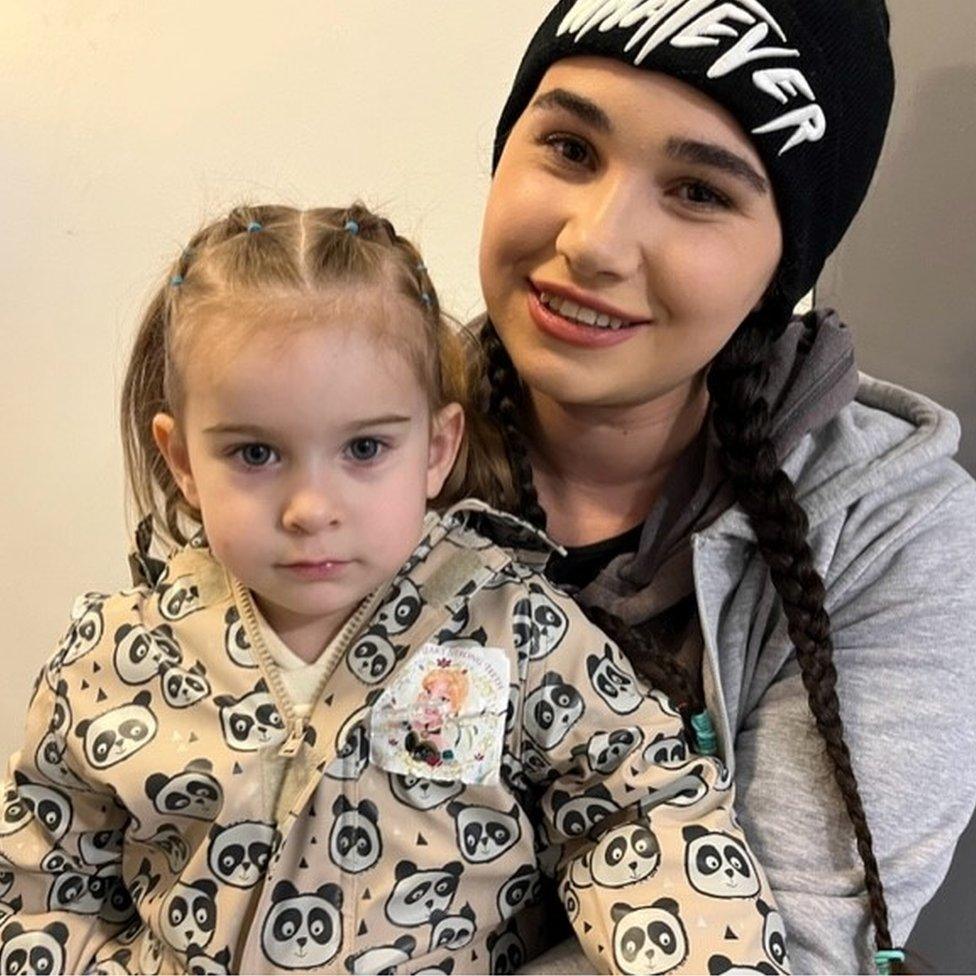Thousands of children sharing beds due to overcrowding
- Published

Joanna Szablewska, with Deni: "I want my daughter to have a normal childhood"
More than two million children in England are living in overcrowded accommodation with little or no personal space, while some 300,000 share beds with family members, new analysis suggests. The BBC has spoken to two families struggling to cope because they do not have enough space.
On the third floor of a large block of flats, Deni Reid squeezes into a small corner to practise her keyboard.
Sitting about a foot away, her mother listens intently, proud not just of her daughter's musical talents, but also of her ability to overcome adversity.
"She's nearly 10 and she's never had her own bedroom," says Joanna Szablewska. "She's always been sharing a bed with me."
'Like a prison cell'
The family pay £860 a month for what their local council deems to be a one-bedroom flat. In reality, it is a shower room, a tiny kitchen/sitting area and a room with a double bed "about the same size as a prison cell", says Joanna.
They were told they would only be here for eight weeks but it has been 13 months.
"We deserve to have at least one single bed each and one wardrobe," says the 36-year-old administrator. "She [Deni] would love to have a desk to do her homework, is that so much to ask for?"
In a letter to the council, pleading for a larger property, Deni wrote: "I've been homeless my whole life. I deserve my own room, space and bed."

There is no room for a table, so Deni does her homework on the floor by the bed she shares with her mother
New National Housing Federation (NHF) analysis, published on Wednesday, suggests:
more than 300,000 children in England have to share beds with other family members
two million children live in cramped conditions, with little or no personal space
ethnic minority households are three times more likely to be overcrowded than white households
more than a quarter of parents living in overcrowded homes questioned by researchers said they regularly had to sleep in a living room, bathroom, hallway or kitchen
Joanna and her daughter were forced to seek council help when private, rented accommodation became too expensive. Joanna had never been able to afford a two-bed property, but, with rents soaring, now struggles to afford a one-bed flat.
They are currently one of 56 homeless families living in Brimstone House, in Stratford, east London. The tower block used to house single people in studio flats but is currently being used by Newham Council to provide temporary and emergency accommodation.
'No space to play'
Joanna works from home, so her daughter has to spend whole days, especially during school holidays, sitting on the bed. "I can't have family over. I can't have a proper Easter, I can't have Christmas. My daughter doesn't have space to play. I barely have space to work. Living here is so depressing," says Joanna.
Under pressure from a local housing action group, Focus E15, the mayor of Newham vowed last year to move all families out of the block by next month, but recently said the deadline would not be met. The council says there has been a 26% increase in homeless households needing help over the past year.
Several families have told the BBC about the cramped conditions they live in: the claustrophobic nature of the rooms, the difficulties of keeping each property tidy and the stress of living in such close proximity to partners and children.
Amira, 21 months, has never had a bath; she has spent her entire life in a small room in the building, says her mother.
Nearby, three-year-old Ehvie loathes showers, constantly screaming. "Because there is no bath, I use a bucket filled with water and put some toys in there - it's the closest I can come to replicating a bath," says her mum, 28-year-old student, Caitlin Rosenbrand.
She too shares her bed with her daughter, but "sometimes I have to sleep on the floor because she can take up the whole bed. If I wake her to scooch her up a little bit, it can be quite difficult for her to go back to sleep, which makes everything more stressful."

Caitlin often sleeps on the floor to give her daughter the bed to herself
Households are considered overcrowded if more than two children under the age of 10, or two teenagers of different sexes, or two adults aged 16 or over - and not in a relationship, share a room.
"Every child deserves the right to have a home that is suitable for their needs and allows them to grow as individuals," said NHF chief executive Kate Henderson.
"Growing up in overcrowded homes can have a devastating impact on a child's self-esteem, wellbeing, and future life chances as well as affecting family relationships and making it harder for parents to nurture their child's growth."
The biggest cause of overcrowding, says the NHF, is a chronic shortage of social housing. Ministers say they are investing £11.5bn to deliver thousands of affordable homes, but campaigners say the change is too slow.
Just a 10-minute walk from Brimstone House sits a picture of England's dysfunctional housing system. Plans to regenerate the Carpenters Estate were originally announced in 2003, residents were moved out of hundreds of council flats more than a decade ago.
Today, the three tower blocks that dominate the estate stand dilapidated and virtually empty, windows smashed and moss growing around them, with those regeneration plans having continually changed over the years.
The latest plans, say Newham council, will see more than 2,000 homes built, in phases, over the next two decades. The council also say they will acquire 500 homes over the next three years to tackle homelessness.
As well as being a keen pianist, Deni is on a scheme for talented singers run by the Royal Opera House. Her dreams are big but her mother's ambitions are more pressing: "I want to end my homelessness circle," says Joanna. "I need permanent, long-term accommodation for me and my daughter, to finally allow her to have a normal childhood."

Have you been affected by the issues raised in this story? Share your experiences by emailing haveyoursay@bbc.co.uk, external.
Please include a contact number if you are willing to speak to a BBC journalist. You can also get in touch in the following ways:
WhatsApp: +44 7756 165803
Tweet: @BBC_HaveYourSay, external
Please read our terms & conditions and privacy policy
If you are reading this page and can't see the form you will need to visit the mobile version of the BBC website to submit your question or comment or you can email us at HaveYourSay@bbc.co.uk, external. Please include your name, age and location with any submission.